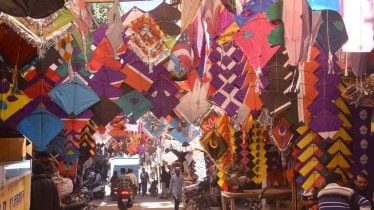Makar Sankranti 2025 Date: Makar Sankranti, a vibrant and ancient Hindu festival, celebrates the Sun’s transition from the Sagittarius zodiac sign to Capricorn. This significant astronomical event marks the end of the winter solstice and the beginning of longer days, symbolising the victory of light over darkness. In 2025, Makar Sankranti will be observed on Tuesday, January 14th.
Makar Sankranti Date and Time
Date: Tuesday, January 14, 2025
Time: Sunrise (8:55 AM) to 12:51 PM (Punyakal)
8:55 AM to 9:29 AM (Mahapunyakal) – This is considered the most auspicious time for religious rituals.
Significance of Makar Sankranti
Makar Sankranti holds profound significance in Hindu culture. It marks the beginning of the auspicious period of Uttarayana, considered to be highly propitious for spiritual practices and endeavours.
Spiritual Renewal: The festival is believed to cleanse the soul and usher in a period of positive energy and good fortune.
Agricultural Significance: As it marks the end of the harvest season in many parts of India, it is a time to express gratitude for the bountiful harvest and celebrate the renewal of nature.
History and Mythology of Makar Sankranti
The roots of Makar Sankranti can be traced back to ancient Vedic scriptures.
Sun God Surya: The festival is deeply connected to the Hindu deity Surya (Sun God), who is revered as the source of life and energy.
Mythological Stories: It is linked to various mythological stories:
Churning of the Ocean (Samudra Manthan): The nectar of immortality (Amrit) was obtained during this event, which occurred during the Makar Sankranti period.
King Bhagirath: The legend of King Bhagirath, who brought the Ganges River to Earth, is also associated with this festival.
Celebrations in Makar Sankranti:
Makar Sankranti is celebrated with great enthusiasm across India, with diverse customs and traditions varying from region to region.
Kite Flying: A popular activity, especially in Gujarat and Punjab, where people fly colorful kites and compete to cut each other’s kites. The sky transforms into a vibrant spectacle of kites during the festival.
Feasting: People prepare and share special dishes like khichdi (a savory rice and lentil dish), til ladoo (sweet sesame seed balls), and other sweet treats.
Bathing in Holy Rivers: Many people take a dip in holy rivers like the Ganges and Yamuna, believing it to be purifying and spiritually cleansing.
Bonfires: In some regions, bonfires are lit to symbolize the burning of negativity and the welcoming of warmth.
Animal Worship: In some areas, animals like cows and bulls are worshipped and decorated as a mark of respect for their contribution to agriculture.
Other Names:
Makar Sankranti is known by different names in various regions of India:
Pongal: In Tamil Nadu and other southern states.
Lohrii: In Punjab and Haryana.
Bhogali Bihu: In Assam.
A Time for Joy and Renewal
Makar Sankranti is a time for joy, gratitude, and renewal. It is a festival that brings people together, fostering a sense of community and shared celebration. The vibrant colours, delicious food, and festive spirit make it a truly memorable occasion.
